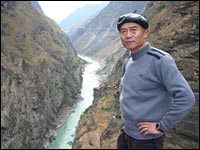China has spent decades trying to harness its powerful river systems with dams. Enormous hydroelectric projects, most notably the Three Gorges Dam now under construction on the Yangtze River, have devastated local economies and ecosystems.

Yu Xiaogang.
Photo: Goldman Environmental Prize.
Chinese environmentalist Yu Xiaogang, founder of the group Green Watershed, says the people harmed by these projects are often silenced, and their stories left untold. Through a pioneering watershed management program in western China, Yu hopes to break this pattern, helping dam-affected communities both publicize their experiences and participate in the decisions that change their lives.
Yu studied the social and environmental impacts of a dam at Lashi Lake for his Ph.D. thesis. He then brought together residents and government officials in the Lashi Lake area to help restore farmland and fisheries, devising programs that eased the desperation of local communities. Yu’s work also helped secure restitution for displaced communities, and establish national guidelines for the assessment of dams’ social impacts.
The Lashi Lake area now serves as an illustration of the true costs of dam-building. In 2003, the Yunnan provincial government announced plans to construct 13 new dams on the Nu River, part of a World Heritage Site. Yu brought villagers from the area to the Mekong River, where they witnessed the legacy of the Manwan Dam, and he helped create a television program on the effects of dams. Chinese Premier Wen Jiabao later put the Nu River dams on hold, citing the need for more research and analysis, but the provincial government wants to move forward with a smaller version of the project.
Yu, 55, was awarded one of six 2006 Goldman Environmental Prizes at a ceremony in San Francisco on April 24. He spoke to Grist from San Francisco with the occasional assistance of a translator.
How has the dam at Lashi Lake affected the local watershed and its people?
The dam was filled in 1994, and after the dam was built, a lot of farmers’ land was flooded. When the people lost their agriculture, they went to the lake to fish, and the fish resource was [overharvested]. So the community lost not only their farmland, but also their fishery. When we visited there, we learned that before the dam, the people had led a very good life. After the dam, they had a very miserable life. They suffered from the dam construction, but most importantly, they suffered from the lack of any participation in decision-making.
How did you come to develop the Lashi watershed project?
After I spent about half a year doing an anthropological investigation, I applied for some money from Oxfam America. Fortunately, they supported this idea of bringing local government and farmers together to recover the watershed and its wetlands with a watershed management committee. Through the committee, the people, the government, and [NGOs] can formulate projects to protect the environment, and bring in some income for local people.

Standing on Tiger Leaping Gorge, overlooking the Yangtze River.
Photo: Tom Dusenbery.
For instance, we have an agro-forestry project that plants fruit trees on mountain farmland. That controls erosion and generates income. We also have a microfinance project for women, so they can have some new income sources. Mountain people are far away from political centers and markets, so we contributed some money to help them build a road. We’ve also tried to maintain the waterway to control floods, so that more land becomes fertile land. We encourage organic agriculture, which has very good production — some people have increased their income four- to five-fold through organic agriculture.
Had anything like this been tried in China before?
The watershed management committee is the first project of its kind in China. We have presented our work at several conferences, and it is always recognized as a pilot.
I understand that the watershed project inspired many local residents to speak publicly about their experiences. How did you encourage them to break their tradition of silence?
For about six years, we have had several kinds of workshops in Lashi Lake, and all of them are very participatory. So the local people have practiced this approach, and gradually they know that they can speak for their own interests, and change their lives themselves. For instance, one of the local people participated in a United Nations hydropower meeting in Beijing, where he could freely dialogue with hydropower CEOs and the decision-makers in the Chinese central government. He could talk with these leaders to protect his interests and his community’s interests.
What kind of opposition did you encounter as you developed the project?
There were many challenges — there are still many rumors about me, about my organization, about the management of the project. There are some rumors that the organization is illegal, and that any people who participate in it should be careful. Many people think I have a secret agenda.
What keeps you going?
We try to respond to the people’s needs, to local environmental needs, and to demonstrate that this approach is more sustainable, and more sociologically and environmentally friendly. Gradually, people are convinced that this project is for themselves, for the local people.
From the very beginning, we think this is the right approach, and that it must have a good result. So we think if we can continue to do this, we’ll continue to demonstrate our results and meet our objectives.
What does this prize mean to you?
I think this prize is very important — I appreciate the prize, and the recognition that the efforts of environmentalists are not easy. Everyone has a story of great risk, but they continue to make a great effort. So I was very honored to be nominated and to get this prize, not only for myself but also for my organization, and for the other Chinese environmental groups that are actively participating in dam campaigns.

